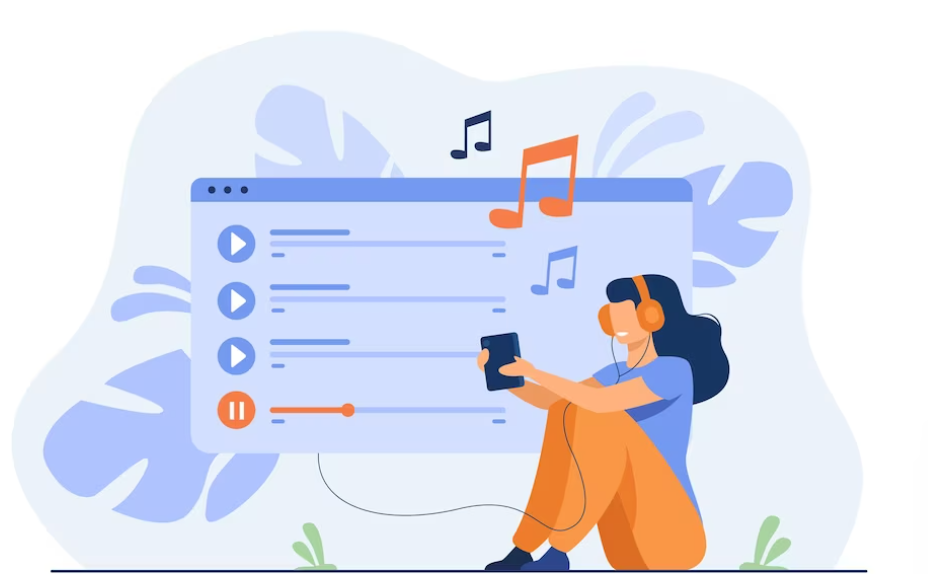Science and research have proven that music can enhance productivity when working on repetitive tasks, helping tune out distractions from the workplace and keeping focus. However, some still swear by silence when studying.
Despite the advantage of listening to music some dangers still remain. It may be worth being cautious whenever playing music at a constant basis. So here are some potential side effects to read and take home.
1. It can be distracting
Listening to music can be an excellent way to boost your mood, yet can become distracting when working. Therefore, it’s essential that you choose appropriate tunes while working; instrumental, classical or jazz music typically helps concentration more while upbeat songs with repetitive lyrics may impair it.
Based on your personality and the music that resonates with you, some types of songs may become distracting. If you need external stimulation to stay awake or avoid boredom, complex compositions with many instruments, varied melodies and fast tempo may be especially unfavorable; such songs tend to occupy mental bandwidth needed for critical thought and problem-solving, making it easy for other stimuli such as visual or auditory stimuli to easily divert your focus away from thinking or problem solving.
Other people may find music inspiring, particularly if they enjoy its genre. If you are drawn to pop, rock or dance music – especially pop, rock and dance music from the 1980s onwards – listening to these songs while working may help increase motivation and productivity; however if listening is likely to distract you, perhaps listening at all might be best avoided during work time.
Music may reduce your working memory capacity. Working memory refers to the amount of data stored in your brain at once that allows for processing and understanding, making quicker decisions and solving of problems much simpler. Studies indicate that listening to music while studying can lower this capacity and make studying and learning harder overall.
Music should only be consumed in moderation; otherwise it can have a devastating impact on our moods and emotions. For example, listening to sad songs while feeling depressed could trigger those negative feelings, making productivity less likely and leading to poor performance and even depression. If music is not your cup of tea right now, other audio options like white noise may work better as distractions from negative feelings – or try white noise or other forms of audio therapy as an alternative solution!
2. It can be addictive
Music can be an excellent tool to increase productivity, but it can also become addictive. According to research from the University of Miami, employees who listen to music finish tasks more quickly and are more creative than those who do not listen. While listening to music is one way to increase productivity, it is essential that you monitor both how often and loudly it is being played; listening too loudly may damage hearing as well as distract from work.
One reason that people become hooked on music is due to it releasing dopamine in their brain, a natural neurotransmitter responsible for creating feelings of pleasure and reward in our bodies. Furthermore, listening to music has a soothing effect which helps reduce stress levels while increasing happiness levels – although music addiction should not be seen as harmful like shopping, sexual acts or drugs; according to health sources like Synergy Wellness Group it may lead to loss of control, priority changes, tolerance increases withdrawal symptoms as well as potentially risky behavior.
Students often struggle to concentrate without music as an aid; however, listening to it may also become distracting and interfere with memory retention. To effectively focus on studies while listening to instrumental soundtracks or classical music can help strengthen concentration abilities while strengthening memorization abilities.
Listening to music can also be a source of negative emotions. Listening to sad or depressing songs may make you feel down and stressed out, which may impact your schoolwork or workplace performance. Furthermore, repeating listening of the same album over and over may be detrimental to mental health; its repetition could trigger negative mood states in you and cause stress-inducing mood swings. If this happens frequently for you, find something else to enjoy instead and take frequent breaks from listening to music altogether.
3. It can be a source of noise pollution
While music can be beneficial, listening to it may also pose risks. Loud music can damage your hearing and increase the risk of tinnitus; conversely, it can make communicating difficult between people. Studies also indicate that music may affect our ability to identify our emotions properly leading to feelings of annoyance, anger and confusion as well as potentially divert us away from important tasks.
Certain songs can have a beneficial effect on your mood and can create feelings of happiness or contentment, while other songs can elicit emotions such as sadness and depression, so choose carefully when selecting music to avoid these effects. For jobs requiring verbal communication, however, it is best to avoid listening to any kind of audio entertainment altogether.
Music can also contribute to noise pollution. Some songs can be too loud, which may disturb those around you and impair focus. Furthermore, lyrics in some music may prove distracting; therefore it may be beneficial if when trying to concentrate it is best to choose music without lyrics so as not to become distracted and remain focused.
Music can improve cognitive performance, an effect known as the Mozart Effect. These benefits stem from an idea that certain types of music can enhance attention and memory; however, the evidence for such claims remains inconclusive and anecdotal; in order to verify these claims scientifically they would need to conduct a controlled experiment where one group listens to classical music while the other does not.
At its core, music can be an excellent way to relax and enhance your mood. However, listening to it at lower volume levels when working or studying can also be helpful. When selecting suitable tunes to listen to, soothing, relaxing instrumental or classical pieces may be best; steady beats may slow your heart rate while fast tempo tunes may increase them; slow music may reduce stress hormone production too!
4. It can be a source of distraction
Studies have demonstrated that certain forms of music can serve as a significant distraction when performing complex tasks. This is especially true with lyrics-containing songs or loud or fast tempo instrumental pieces; when listening to music while trying to complete complex tasks, your brain processes both the lyrics in the song as well as any associated information being processed simultaneously, leading to cognitive overload that makes understanding and remembering information more challenging.
Listening to music can also serve as an effective distraction from stimuli that easily overwhelm people, according to studies. People who are more extroverted tend to become distracted more quickly from tasks by music than introverted individuals; which may suggest an association between personality traits and how music impacts task performance.
One reason music can be an interruption is its potential to induce negative emotions and interfere with our ability to concentrate. This is particularly true if we listen to upbeat or happy tunes; sad songs on the other hand could cause us to withdraw from activities altogether and can even negatively influence sleep patterns.
Music can also be an interruption when we’re trying to socialize, which can be problematic in workplace environments where listening to music may be discouraged or forbidden altogether, as well as at home when trying to work together on projects with family members.
Music can be an incredibly beneficial asset to the workplace when used at an appropriate volume and context. For example, when trying to focus on difficult tasks it can help to listen to calm, soothing music that lowers heart rate and blood pressure and thus aid concentration and sleep quality at night. When working with clients or colleagues it can also be useful to use familiar, upbeat music as it creates positive emotions while building a sense of togetherness among colleagues or clients.







